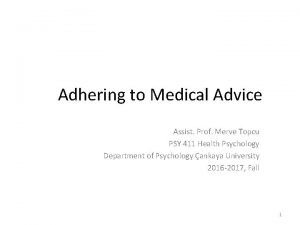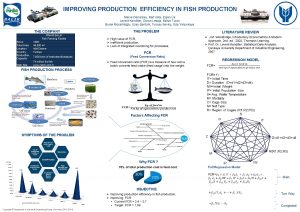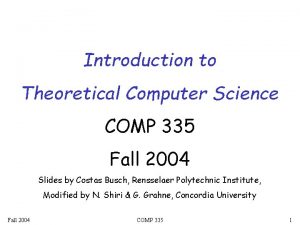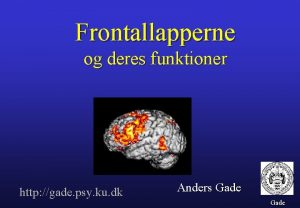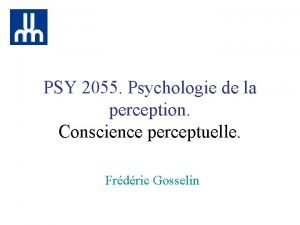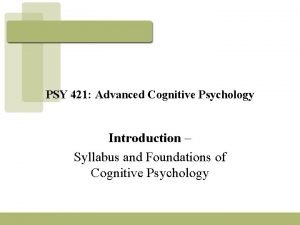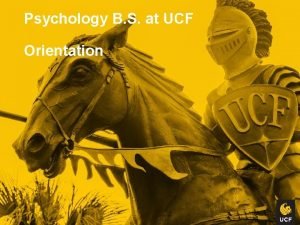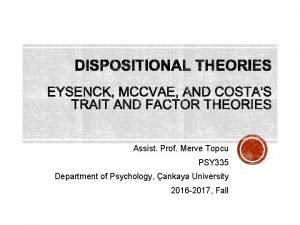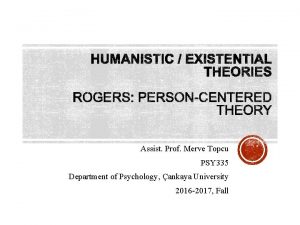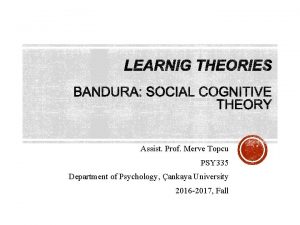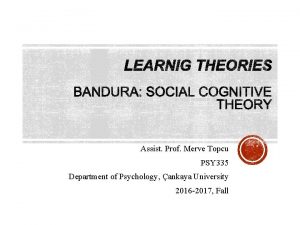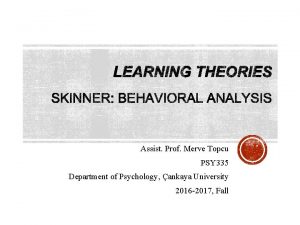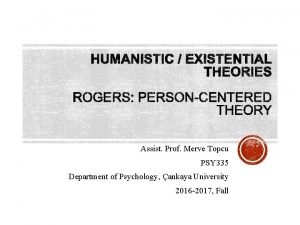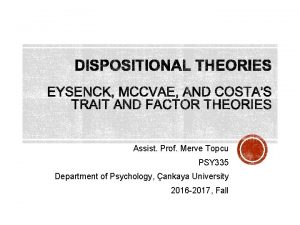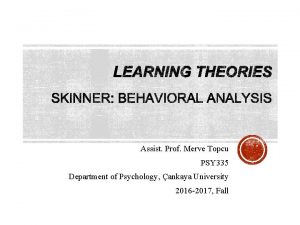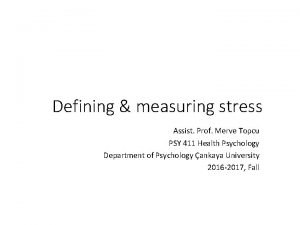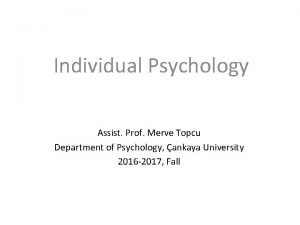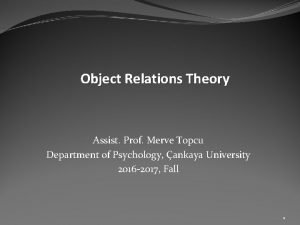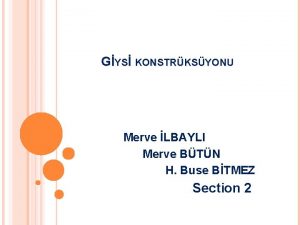Assist Prof Merve Topcu PSY 335 Department of







































- Slides: 39

Assist. Prof. Merve Topcu PSY 335 Department of Psychology, Çankaya University 2016 -2017, Fall

§ Assumptions § the whole person is constantly being motivated by one need or another § people have the potential to grow toward psychological health, that is, self-actualization § Maslow believed that humans have a higher nature than either psychoanalysis or behaviorism would suggest § Third force in psychology

§ holistic approach to motivation § basic assumptions § whole person, not any single part or function, is motivated § motivation is usually complex § the motivation for a behavior may be unconscious or unknown to the person § people are continually motivated by one need or another § when one need is satisfied, it ordinarily loses its motivational power and is then replaced by another need § all people everywhere are motivated by the same basic needs § the manner changes § needs can be arranged on a hierarchy

• Hierarchy of conative needs • lower level needs must be satisfied The more a lower level need is satisfied, the greater the emergence of the next level need. • Physiological needs differ from other needs in at least two important respects: 1. they are the only needs that can be completely satisfied or even overly satisfied 2. their recurring nature of physiological needs Self-actualization Esteem Love & belongingness Safety Physiological needs

§ Safety needs, including physical security, stability, dependency, protection, and freedom from threatening forces such as war, terrorism, illness, fear, anxiety, danger, chaos, and natural disasters § Spending more enrgy than necessary called basic anxiety § Love and belongingness needs, such as the desire for friendship; the wish for a mate and children; the need to belong to a family, a club, a neighborhood, or a nation 1. Experience love & feeling being loved 1. Coping w/ rejection easily 2. Having never been experienced love & belongingness 1. Learn to devalue love § Receiving love & belongingness in small doses § strongly motivated to seek affection and acceptance

§ Esteem needs, which include self-respect, confidence, competence, and the knowledge that others hold them in high esteem § Two levels of esteem needs: § Reputation § The perception of the prestige, recognition, or fame § Based on others’ opinions § Self-esteem § Person's own feelings of worth and confidence § "desire for strength, for achievement, for adequacy, for mastery and competence, for confidence in the face of the world, and for independence and freedom"

§ Self-actualization needs include self-fulfillment, the realization of all one's potential, and a desire to become creative in the full sense of the word § Once esteem needs are met, they do not always move to the level of self -actualization § B-values § Highly respect such values as truth, beauty, justice § Express their basic human needs and do not allow them to be suppressed by culture

§ Maslow identified three other categories of needs 1. Aesthetic § not universal § motivated by the need for beauty and aesthetically pleasing experiences 2. Cognitive § a desire to know, to solve mysteries, to understand, and to be curious § When cognitive needs are blocked, all needs on Maslow's hierarchy are threatened § healthy people desire to know more, to theorize, to test hypotheses, to uncover mysteries, or to find out how something works just for the satisfaction of knowing § If not satisfied, become pathological § a pathology that takes the form of skepticism, disillusionment, and cynicism 3. Neurotic § neurotic needs lead only to stagnation and pathology § Reactive § serve as compensation for unsatisfied basic needs

§ a person may be simultaneously motivated by needs from two or more levels § be the honorary guest at a dinner given by close friends in a peaceful restaurant § Reversed Order of Needs § Reversals are usually more apparent than real § unconscious motivation underlying the behavior § Some behavior is not caused by needs but by other factors such as conditioned reflexes, maturation, or drugs § "expressive behavior" is unmotivated Copyright © Allyn & Bacon (2012)

§ Expressive behavior § usually unlearned, spontaneous, and determined by forces within the person rather than by the environment § often unmotivated § often an end in itself and serves no other purpose than to be § frequently unconscious and usually takes place naturally and with little effort § behavior includes such actions as slouching, looking stupid, being relaxed, showing anger, and expressing joy § include one's gait, gestures, voice, and smile or art, play, enjoyment, appreciation, wonder, awe, and excitement § Coping behavior § Conscious, effortful, learned, and determined by the external environment § motivated and aimed at satisfying a need

§ Lack of satisfaction of any of the basic needs leads to some kind of pathology § Deprivation of physiological needs results in malnutrition, fatigue, loss of energy, obsession with sex § Deprivation of safety needs leads to fear, insecurity, and dread § Deprivation of love needs causes person becoming defensive, overly aggressive, or socially timid § Deprivation of esteem results in the illnesses of self-doubt, self-depreciation, and lack of confidence § Deprivation of self-actualization needs leads to metapathology § Maslow (1967) defined metapathology as the absence of values, the lack of fulfillment, and the loss of meaning in life

§ some human needs are innately determined § E. g. , Sex is a basic physiological need, but the manner in which it is expressed depends on learning § The level of pathology upon frustration § Persistent and their satisfaction leads to psychological health § Species-specific § Human motivation vs animal motivation § be molded, inhibited, or altered by environmental influences § can be changed and even destroyed by the more powerful forces of civilization

Higher level needs (love, esteem, Lower level needs (physiological and self-actualization) safety). • later on the phylogenetic or evolutionary • Earlier • scale • appear later during the course of individual • must be cared for in infants and children development before higher level needs become operative • produce more happiness and more peak experiences • More subjectively desirable. Low motivation to go back lower stages • produce a degree of hedonistic pleasure. Temporary • Higher motivation

§ «Good Human Being» § Initial criteria, valuing privacy too much § They were free from psychopathology § Self-actualizing people had progressed through the hierarchy of needs § embracing of the B-values § Fullfill needs to grow, to develop, and to increasingly become what they were capable of becoming § ‘Self-actualization’ means to become everything that one can become, to actualize or fulfill all of one's potentials. § When people can accomplish this goal, they become more unique, more heterogeneous, and less shaped by a given culture


§ Q: Why some people have their lower needs satisfied, are capable of giving and receiving love, possess a great amount of confidence and selfesteem, and yet fail to pass over the threshold to self-actualization § Self-actualizing people are motivated by the ‘eternal verities’ what he called B-values § Metaneeds, the ultimate level of needs § When not met, existential illness occurs § Deprivation of any of the B-values results in metapathology § the lack of a meaningful philosophy of life § Metamotivation, distinguished from ordinary need motivation § expressive rather than coping behavior § 14 B-values: truth, goodness, beauty, wholeness or the transcendence of dichotomies, aliveness or spontaneity, uniqueness, perfection, completion, justice and order, simplicity, richness or totality, effortlessness, playfulness or humor, and self-suficiency or autonomy

§ More Efficient Perception of Reality § Acceptance of Self, Others, and Nature § Spontaneity, Simplicity, and Naturalness § Problem-Centering § The Need for Privacy § Autonomy § Continued Freshness of Appreciation § The Peak Experience § Gemeinschaftsgefiihl § Pro found Interpersonal Relations § The Democratic Character Structure § Discrimination Between Means and Ends § Philosophical Sense of Humor § Creativeness § Resistance to Enculturation

§ Maslow believed that all humans have the potential for self- actualization § To be self-actualizing, people must be regularly satisfied in their other needs and must also embrace the B-values § 15 tentative qualities that characterize self-actualizing people to at least some degree

§ More Efficient Perception of Reality § easily detect phoniness in others § discriminate between the genuine and the fake Character. Istıcs of Self-Actualızıng § can see both positive and negative underlying traits in others People § perceive ultimate values more clearly § are less prejudiced § less likely to see the world as they wish it to be § less afraid and more comfortable with the unknown § greater tolerance of ambiguity § welcome doubt, uncertainty, indefiniteness, and uncharted paths

§ Acceptance of Self, Others, and Nature § Self-actualizing people can accept themselves the way they are § lack defensiveness, phoniness, and self-defeating guilt § not overly critical of their own shortcomings § accept others and have no compulsive need to instruct, inform, or convert § realize that people suffer, grow old, and die

§ Spontaneity, Simplicity, and Naturalness § are spontaneous, simple, and natural § highly ethical but may appear unethical or nonconforming § The similarity between self-actualizing people and children and animals § live simple § not afraid or ashamed to express joy, awe, elation, sorrow, anger, or other deeply felt emotions

§ Problem-Centering § interest in problems outside themselves § Task-oriented and concerned with problems outside § This interest allows selfactualizers to develop a mission in life § Their occupation is not merely a means to earning a living but a vocation, a calling, an end in itself § concerned with eternal problems

§ The Need for Privacy § be alone without being lonely § feel relaxed and comfortable when they are either with people or alone § can find enjoyment in solitude and privacy § little energy attempting to impress others or trying to gain love and acceptance § Have more ability to make responsible choices

§ Autonomy § autonomous and depend on themselves § the confidence that one is loved and accepted without conditions or qualifications can be a powerful force in contributing to feelings of self-worth § Once that confidence is attained, a person no longer depends on others for self-esteem § independence gives them an inner peace and serenity not enjoyed by those who live for the approval of others.

§ Continued Freshness of Appreciation § "self-actualizing people have the wonderful capacity to appreciate again and again, freshly and naively, the basic goods of life, with awe, pleasure, wonder, and even ecstasy « § are keenly aware of their good physical health, friends and loved ones, economic security, and political freedom § not waste time complaining about a boring, uninteresting existence § "retain their constant sense of good fortune and gratitude for it"

§ The Peak Experience § Experiences that were mystical in nature and that somehow gave them a § § § § feeling of transcendence report a sort of transcendence, a loss of self, or a feeling of being separated from their body these experiences cannot be brought on by an act of the will; occur at unexpected, quite ordinary moments people having a peak experience see the whole universe as unified or all in one piece see clearly their place in that universe during this mystical time, peakers feel both more humble and more powerful at the same time Peakers experience a loss of fear, anxiety, and conflict and become more loving, accepting, and spontaneous Peak experience often has a lasting effect on a person's life

§ Gemeinschaftsgefiihl § Adler's term for social interest, community feeling, or a sense of oneness with all humanity § had a kind of caring attitude toward other people § may become angry, impatient, or disgusted with others; but they retain a feeling of affection for human beings in general § self-actualizing people are "often saddened, exasperated, and even enraged by the shortcomings of the average person «, but nevertheless, they continue to feel a basic kinship with that person

§ Profound Interpersonal Relations § a special quality of interpersonal relations that involves deep and profound feelings for individuals § close friendships are limited to only a few § tend to choose healthy people as friends and avoid intimate interpersonal relationships with dependent or infantile people § their social interest allows them to have a special feeling of empathy for these less healthy persons § preferring instead relationships that were mutual rather than one-sided

§ The Democratic Character Structure § be friendly and considerate with other people regardless of class, color, age, or gender § seemed to be quite unaware of superficial differences among people § have a desire and an ability to learn from anyone § recognize how little they know in relation to what they could know § not passively accept evil behavior in others

§ Discrimination Between Means and Ends § have a clear sense of right and wrong conduct and have little conflict about basic values § set their sights on ends rather than means and have an unusual ability to distinguish between the two § "they can often enjoy for its own sake the getting to some place as well as the arriving. It is occasionally possible for them to make out of the most trivial and routine activity an intrinsically enjoyable game"

§ Philosophical Sense of Humor § The laugh is usually at someone else's expense § The humor of a self-actualizing person is intrinsic to the situation rather than contrived; it is spontaneous rather than planned § Situation-dependent § One must "be there" to appreciate it

§ Creativeness § Maslow suggested that creativity and self-actualization may be one and the same § Are creative in their own way § have a keen perception of truth, beauty, and reality ingredients that form the foundation of true creativity

§ Resistance to Enculturation § have a sense of detachment from their surroundings and are able to transcend a particular culture § are neither antisocial nor consciously nonconforming § they are autonomous, following their own standards of conduct and not blindly obeying the rules of others § not waste energy fighting against insignificant customs and regulations of society § For this reason, these healthy people are more individualized and less homogenized than others

§ Everyone is born with a will toward health, a tendency to grow toward self-actualization, but few people reach it § Growth toward normal, healthy personality can be blocked at each of the steps in the hierarchy of needs § the Jonah complex, the fear of being one's best § characterized by attempts to run away from one's destiny § is found in nearly everyone § represents a fear of success § a fear of being one's best § a feeling of awesomeness in the presence of beauty and perfection

§ Why do people run away from greatness and self-fulfillment? § the human body is simply not strong enough to endure the ecstasy of fulfillment for any length of time, just as peak experiences and sexual orgasms would be overly taxing if they lasted too long § "This is too much" or "I can't stand it anymore. « § Most people have private ambition to be great, but when they compare themselves with those who have accomplished greatness, they are appalled by their own arrogance: § "Who am I to think I could do as well as this great person? ‘ § a defense against grandiosity or "sinful pride « § Adopt the self-defeating approach of running away from the realization of their full potentials

§ Love and belongingness needs are prerequisites for self-actualiation § deficiency love (D - love) § B-love, love for the essence or "Being" of the other § mutually felt and shared and not motivated by a deficiency or incompleteness within the lover § Sex between two B-lovers often becomes a kind of mystical experience § the spirit of playfulness and humor § playfulness and humor are B-values

§ Value-free science does not lead to the proper study of human personality § Psychological science should place more emphasis on the study of the individual and less on the study of large groups § Desacralization § the type of science that lacks emotion, joy, wonder, awe, and rapture § Scientists must be willing to resacralize science or to instill it with human values, emotion, and ritual § Taoistic attitude for psychology § one that would be noninterfering, passive, and receptive § Psychologists must themselves be healthy people, able to tolerate ambiguity and uncertainty

§ Personal Orientation Inventory § measure the values and behaviors of self-actualizing people § 2 major scales and 10 subscales w/ 150 forced-choice items 1. the Time Competence / Time Incompetence scale § measures the degree to which people are present oriented 2. the Support scale § Measure whether an individual's mode of reaction is characteristically 'self' oriented or 'other' oriented § The 10 subscales 1. Self-actualization values 2. flexibility in applying values 3. sensitivity to one's own needs and feelings 4. spontaneity in expressing feelings behaviorally 5. Self-regard 6. Self-acceptance 7. Positive view of humanity 8. Ability to see opposites of life as meaningfully related 9. Acceptance of aggression 10. Capacity for intimate contact

§ The aim of therapy would be for clients to embrace the Being values § clients must be free from their dependency on others so that their natural impulse toward growth and self-actualization could become active § The goals of psychology follow from the client's position on the hierarchy of needs § Through a warm, loving, interpersonal relationship with therapist, the client gains satisfaction of love and belongingness needs and thereby acquires feelings of confidence and self-worth
 Merve topcu
Merve topcu Psy 335 purdue
Psy 335 purdue Ilker topçu
Ilker topçu Ufuk topcu
Ufuk topcu Ahmet topçu betonarme
Ahmet topçu betonarme Merve uzunöz
Merve uzunöz Tiroid nodülünde kanlanma nedir
Tiroid nodülünde kanlanma nedir Merve utku
Merve utku Mescidi hayf
Mescidi hayf Merve başkurt kimdir
Merve başkurt kimdir Okul veya mezuniyet derecesi uygunsuz
Okul veya mezuniyet derecesi uygunsuz Merve denizci nazlıgül
Merve denizci nazlıgül Nedrve
Nedrve ödev yapmayınca bahaneler
ödev yapmayınca bahaneler Aligu test
Aligu test Fish
Fish Merve diyar
Merve diyar Merve gözütok
Merve gözütok Meryem merve ören
Meryem merve ören Sim 335
Sim 335 Cpsc 335
Cpsc 335 30 tac 335
30 tac 335 Builder design pattern uml diagram
Builder design pattern uml diagram Cmsc335
Cmsc335 30 tac 335
30 tac 335 Csc 335
Csc 335 Comp335
Comp335 30 tac 335
30 tac 335 Cpsc 335
Cpsc 335 Cpsc 335
Cpsc 335 Cmsc 335
Cmsc 335 Psy
Psy Euro psy
Euro psy Psy 226
Psy 226 Psy ku
Psy ku Psy 2055
Psy 2055 11 psy
11 psy Psy
Psy Ucf psi chi
Ucf psi chi Psy walsh
Psy walsh
